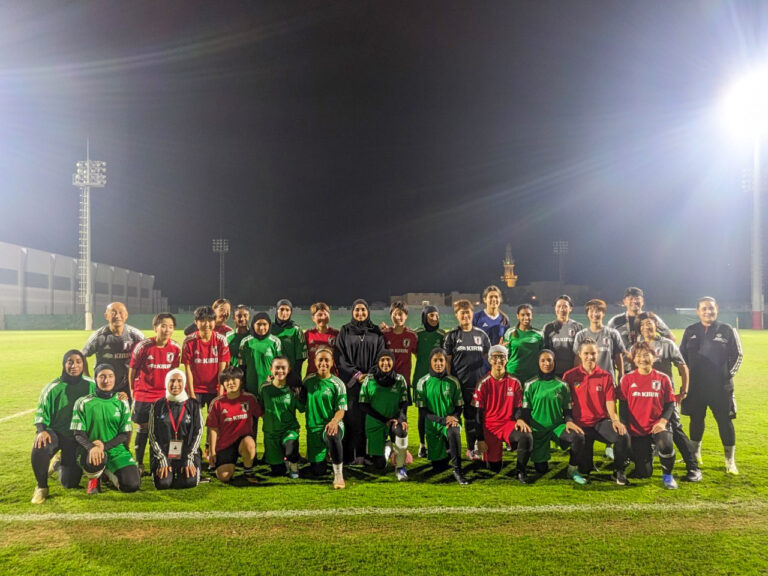In 2022, the Japan International Cooperation Center or JICE (sic) invited the Special Olympics UAE women’s football (soccer) team to Japan for cultural exchange and to have a friendly match. The Japan Women’s Intellectual Disability Football Team, organized by JFFID (the Japan Football Federation for those with Intellectual Disabilities), represented the country in the match. As many know, the Special Olympics is an international athletic organization that provides people with disabilities training and events to showcase their accomplishments. The concept is based on the approach of Unified Sports®, which pairs “athletes” with intellectual disabilities and “partners” without disabilities to compete together on the same team. We had the pleasure of interviewing Masayuki Inaba, manager of the Japan women’s team and head of the JFFID Women’s Committee.
Could you briefly explain the rules and organization?
The team members consist of girls who are in junior high school or above. A team of seven consists of four athletes and three partners. The rules are also original. There is no offsides penalty, goalkeepers always need to throw/roll the ball when they catch it (no kicking), and things like that. On the bench, we sometimes use visual aids to confirm and change positioning on the field.
Were you able to raise awareness of your team by playing a friendly international match with UAE?
The 2022 game with UAE allowed us to further develop the program and in December 2023, our team was sent to UAE as a part of the international dispatch program. The aim of this program was to support women’s empowerment in both Japan and UAE, to strengthen the relationship between the countries, and to enhance the techniques of football for disabled people. This satisfied the 5th and 10th SDG goals, which are gender equality, and reduced inequality within and among countries.
I’m sure that the overseas trip was very meaningful for the team. Could you share some high points of their experience?
On the pitch, playing against foreign athletes with a style different from ours, we could highlight each individual’s strength and also work as a team. We were also able to showcase our team’s strengths: diligence, dexterity, agility, and coordination. Off the field, it was good for them to adjust to the lifestyle of a different culture and learn how to behave in public. Interacting with foreign athletes and spending extended time away from their parents and supporters was also a positive life lesson. Our players demonstrated great adaptability. And, of course, it was good that no one got sick or injured.
What were some of the challenges you faced?
In Japan we are so used to everything being structured and adhering to a plan. It was tough dealing with situations that were very much the opposite. For example, we only learned the pitch we were playing on right before the game, there were scheduling changes, our assigned interpreter wasn’t available, and our staff was suddenly asked to be a referee. It was a challenging new experience, but positive. Also, because graduation trips were canceled due to the pandemic, most of our players had never traveled outside of Japan, or even been on a plane. It took considerable time to prepare them and provide guidance as well as attend to their mental health.
Usually we only hear the assessments of medical and educational professionals. There are few opportunities to hear stories from the people themselves. Could you share somebody’s impressions?
Athlete Rio Nitta from Kanagawa gave us this answer: The athletes from the UAE team were different from us in terms of physical strength and speed. I really appreciate the staff and everyone involved for all the work they’ve done for us. I don’t think we could’ve given so much effort without them. I was happy that people in the stands chanted “Nippon” (Japan) in the third match. I hope to improve my dribbling and the speed of my decision making so I can be chosen again for the team.
Could you share your goals for the future?
We hope to host a world football championship for women with intellectual disabilities so our team will have the opportunity to compete against other countries. We’d also like to continue the exchange program with UAE. Furthermore, to increase the opportunities for women to play football in Japan, I’m hoping to set up organizations domestically. Obtaining funding is an important task and we are looking for sponsors who agree with the direction of our activities. We are thankful that we have a lot of people supporting us.
We are rooting for you! Thank you for your time.


